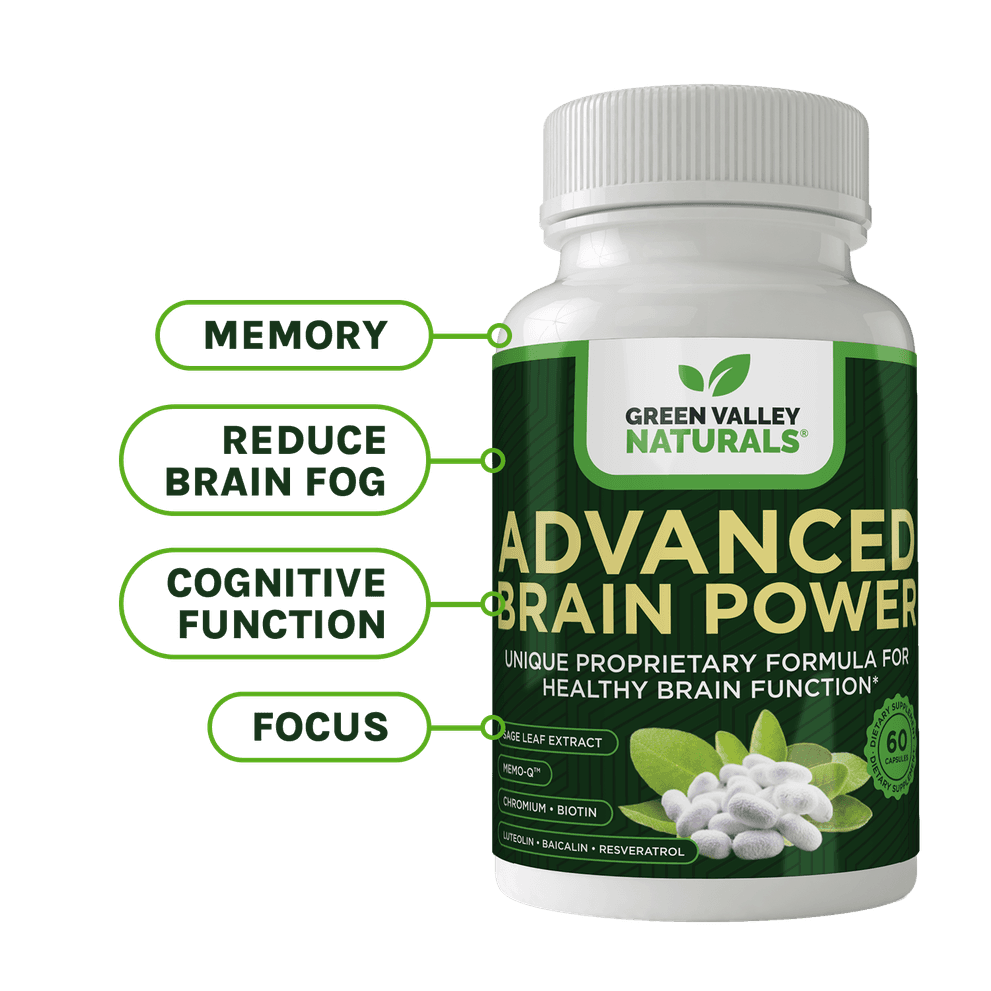
Most people experience brain fog from time to time... that cloudy-headed feeling also known as mental fog, mental fatigue or mental sluggishness. Whatever you call it, brain fog isn't just a fleeting annoyance; it's a condition that can significantly impact your daily life. With the right strategies, some people have experienced their brain fog completely resolved.
What causes it, and how can you clear the haze for good?
Dive into this eye-opening exploration to uncover the surprising triggers behind brain fog and discover practical, science-backed strategies to reclaim your mental clarity.

Key Takeaways
-
Inflammation Connection: Brain fog is often linked to inflammation caused by conditions like autoimmune diseases, chronic fatigue, or even obesity.
-
Lifestyle Impact: Poor sleep, stress, and nutritional deficiencies are major contributors, but they can be mitigated with simple lifestyle changes.
-
Effective Solutions: Regular exercise, a healthy diet, and nootropics like Bacopa monnieri and Citicoline can help improve cognitive function and clarity.
What is Brain Fog?
Brain fog is common in all age groups. It's a state of feeling mentally drained, forgetful, and unable to concentrate or function at the speed we usually function at. It's not a medical term or diagnosis, but a colloquial term for a cluster of symptoms that can include cognitive and memory deficits, impacting how you think, remember, and concentrate. You may feel confused, disorganized, or find it hard to express your thoughts in words or maybe even lose a train of thought in mid-sentence.
It's also not the same as fatigue or lethargy, though they can occur simultaneously. It's sometimes described as mild memory loss or difficulty concentrating. But it's not the same as long-term cognitive impairment.

What Does Brain Fog Feel Like? Symptoms of Brain Fog
There are many symptoms of brain fog -- cognitive, mood-related, and physical -- as well as an astounding number of potential root causes.
Some individuals experience debilitating cognitive deficits that significantly impact their daily lives.
Seven Cognitive Symptoms
It's no surprise that brain fog is often called cog-fog, because many of the symptoms are cognitive in nature. Cognitive deficits can include memory problems and impaired executive function.
-
Difficulty concentrating and focusing. Sluggish thinking and the inability to "turn off" unnecessary distractions, such as turning off phone and email notifications so you can concentrate and focus on the most important task at hand.
-
Forgetfulness. You might forget appointments, peoples' names, where you left your keys, or what you went to another room to do.
-
Slower thinking and processing speed. This can feel like you're half asleep in the middle of the day.
-
Trouble finding the right word. Maybe you struggle to express a thought, or lose your train of thought in mid-sentence.
-
Difficulty understanding new information, or the inability to follow instructions.
-
Impaired problem-solving and planning abilities, which requires being able to analyze a problem from various angles and see the advantages and disadvantages of various courses of action.
-
Reduced ability to multi-task.
Four Mood-Related Symptoms
Brain fog doesn’t just affect your ability to think clearly—it can also significantly impact your mood and emotional well-being. These mood-related symptoms are often intertwined with the cognitive and physical aspects of brain fog, making it a multi-dimensional experience. Mood-related symptoms can negatively impact brain health, contributing to cognitive impairments. Here are the most common mood-related mind fog symptoms and their potential causes:
-
Feeling spacey, confused, or not "with it." Many people feel like this when they're sick, but no one wants to feel this foggy when they're not sick!1
-
Lack of mental clarity. With dozens of tasks at hand, how do you prioritize the task list so you don't end up jumping from task to task, while completing none?2
-
Reduced motivation, and lack of ideas. A feeling of listlessness, not caring about what you're doing. And to make matters worse, a lack of ideas on how to address the situation.3
-
Mood swings and irritability. Also affected by sugar or caffeine highs and lows, hormonal changes or imbalances, or a lack of serotonin to the brain.4
Three Physical Symptoms
While brain fog is often associated with cognitive issues like forgetfulness and difficulty concentrating, it can also manifest as physical symptoms. These physical signs are often linked to underlying illness, inflammation, hormonal imbalances, or lifestyle factors. Physical symptoms of brain fog can also be seen in conditions like traumatic brain injury. Here are some common physical foggy head symptoms and the conditions that cause them:
-
Fatigue or low energy. This is common in people who experience brain fog and also suffer from chronic fatigue syndrome, fibromyalgia (fibro brain) chronic pain, or side effects from chemotherapy treatments ("chemo brain").5
-
Headaches, including migraines. This symptom can manifest in people with brain fog who also have either acute or chronic illnesses including everything from allergies to autoimmune disease.6
-
Insomnia or sleep disorders. The inability to fall asleep and stay asleep is not uncommon in people suffering from brain fog and can be related to anxiety, stress, or hormonal imbalances.7
If you're suffering from chronic brain fog and any of these physical symptoms, it's important to talk to your doctor and be assessed for an underlying medical condition. They can order blood tests and brain scans to check for underlying causes. Also, talk to your healthcare provider about your medication list to see if your medications cause brain fog.
If you've already been diagnosed with a condition, consider talking to your doctor about adjusting your treatment plan to help you manage these symptoms and feel better.
No matter what the cause, many of the natural solutions to brain fog should also help you find relief-- we'll talk about those in a minute. First, let's dig deeper into the root causes of brain fog.
Identifying the Root Cause of Brain Fog to Find the Best Solution
The first and most important step in alleviating the symptoms of foggy brain is to discover what caused it. For example:
-
Insufficient sleep -- Can lack of sleep cause brain fog? Absolutely, yes! Your brain needs 7 to 9 hours of rest to function well.
-
Poor diet / nutritional deficiencies -- Certain nutrients are essential to good health and brain function.
-
Alcohol or other substance abuse -- These are known brain stressors.
-
Environmental factors -- Electromagnetic frequencies (EMFs), radiation, toxins.
-
Stress and anxiety. Brain fog and anxiety co-exist with each other, and often with sleep disorders also. In addition, stress can make most or all of the mental health triggers worse.
-
Depression.
-
Hormonal changes from pregnancy or menopause. Hormonal imbalances -- Including hypothyroidism and hormone changes during pregnancy and menopause.
-
Chronic pain conditions such as chronic fatigue syndrome and fibromyalgia (colloquially called fibro fog and fibro brain).
-
Certain medications or treatments such as cancer treatment. Chemotherapy and other cancer treatments cause systemic effects, according to Emery University.
-
Autoimmune conditions (lupus and multiple sclerosis).
Long COVID. Brain fog is a primary symptom of long Covid, most likely linked to inflammation. New research shows that the virus lives on in your gut after other symptoms resolve, changing your gut microbiome and reducing serotonin, which can reduce cognition, according to a Cleveland Clinic report.
-
Adrenal fatigue. Poorly functioning adrenals -- a common, but often unrecognized health concern in America today.
Maintaining optimal cognitive function is crucial for alleviating brain fog symptoms. Fortunately, there are solutions available, and they're more accessible than you may think.
How to Overcome Brain Fog

Sleep to Improve Cognitive Function
Sleep may be a leading cause of brain fog and temporary cognitive impairment.
It's important to realize that sleep is not just a passive state of rest. It's an active process during which our brains undergo mission-critical maintenance. Sleep's crucial role in cognition can absolutely not be overstated! During sleep, your brain performs a series of complex processes critical to cognitive function. A very important process is consolidation of memories -- which means that information learned throughout the day is transferred from short-term to long-term storage, and is essential for learning and retaining new information.
Sleep also plays a key role in clearing out toxins and waste products that accumulate in the brain while you're awake. The glymphatic system (your brain's waste-clearing system) is most active during sleep. When we don't get enough sleep, these toxin-removing systems are disrupted, resulting in neuro-chemical changes.
Sleep may be a leading cause of brain fog and temporary cognitive impairment.
It'’s important to realize that sleep is not just a passive state of rest. It'’s an active process during which our brains undergo mission-critical maintenance. Sleep'’s crucial role in cognition can absolutely not be overstated! During sleep, your brain performs a series of complex processes critical to cognitive function. A very important process is consolidation of memories --– which means that information learned throughout the day is transferred from short-term to long-term storage, and is essential for learning and retaining new information.
Sleep also plays a key role in clearing out toxins and waste products that accumulate in the brain while you’re awake. The glymphatic system (your brain’s waste-clearing system) is most active during sleep. When we don’t get enough sleep, these toxin-removing systems are disrupted, resulting in neuro-chemical changes.
Sleep deprivation creates neurotransmitter imbalances. For example, insufficient sleep leads to lower dopamine levels.
Sleep deprivation is a recipe for brain fog. And it also intensifies chronic pain. Lack of sleep makes you less resilient and more sensitive to pain.
Sufficient sleep is crucial for cognitive function and memory consolidation. Aim for 7-9 hours of quality sleep every night to energize and refresh your brain for the new day. Some helpful tips? Establish a consistent sleep schedule, limit food and avoid alcohol in the evening, turn off bright lights and devices a couple hours before bedtime to improve your sleep quality. If you still have trouble sleeping, see a sleep specialist.

Exercise for Your Brain
Shoot for 150 minutes of moderate activity every week, or 30 minutes per day, 5 days per week. Take regular breaks from sitting throughout the day and walk around the block.
Manage Stress and Anxiety
Chronic stress can promote cognitive dysfunction, so it's useful to find ways to manage it, such as deep breathing exercises, meditation, mindfulness exercises, and daily walks. Find activities you enjoy. Reduce stress for improved mental health and less brain fog.
Choose the Right Nutrition and Supplements
It's important to eat nutritious foods. Certain foods relieve brain fog more than others -- such as anti-inflammatory foods with antioxidants and omega-3s (think salmon, walnuts, and flaxseeds).
Focus on whole foods, lean proteins, and plenty of fruits and vegetables. The MIND diet (Mediterranean-DASH Intervention for Neurodegenerative Delay) focuses on olive oil, fruits and veggies, nuts and beans, fish, and whole grains to help support brain health and memory health for your full life span.
Avoid trigger foods that cause brain fog, such as processed foods and foods high in sugar and salt.
The benefits of certain supplements are well-documented and not for the placebo effect. Nootropics (supplements that support brain function) are among the supplements that can help. Some effective nootropics include Citicoline (Cognizin), Lion's mane, Bacopa monnieri, fish oil, Ginkgo biloba, and phosphatidylserine.
Learn more about today's leading nootropics.
You'll also want to stay hydrated by drinking plenty of filtered water.
Seek Support and Resources
Family, friends, support groups, and online resources can also be helpful in managing brain fog.

Create a Self-Care Plan
Keep a journal to track your brain fog symptoms, and note what factors it appears with. On a related note, a food and supplement journal can be indispensable in discerning potential nutrient deficiencies that may trigger that brain foggy feeling.
Self-care activities, including exercise, meditation, yoga, and spending time with friends and loved ones can help improve your mood and cognition. Try to balance work and leisure, emphasizing active leisure, which boasts many brain benefits.
When choosing activities or therapies specifically for brain fog, look for research-backed solutions. Placebo-controlled clinical trials are essential for validating the effectiveness of treatments for brain fog.
It's also useful to take a hard look at your calendar. Are you booked to the gills? Perhaps learning to say "no" to a few things would provide some needed breathing room and time for self-care, such as exercise and meditation.
Learn to set realistic goals and then break those tasks into smaller steps. Focus intently on one thing at a time. This can help improve cognition. Also memory aids, such as making lists and using reminders like cell phone alarms (or a good ol' written planner), can help. Set a designation location for your keys and other critical items.
Summary
Brain fog, though not a medical diagnosis, describes a cluster of cognitive symptoms like forgetfulness, sluggish thinking, and difficulty concentrating. It can result from inflammation, hormonal changes, stress, or lifestyle factors like poor sleep and diet. While identifying the root cause may require medical guidance, many cases can be improved with better sleep, exercise, stress management, and nutrient-rich foods. Supplements and mindfulness techniques can further support mental clarity and focus.
Frequently Asked Questions
How do you test for brain fog?
Talk to your healthcare provider. Blood tests and brain scans can be used as diagnostic options to test for brain fog. Health journals may hint at other conditions involved, and food journals can also help your doctor lock in on the root causes. Your doctor will likely rely on more than a single test since some causes can mimic other issues.
What does brain fog feel like?
Brain fog can be hard to define since it's not a medical term or diagnosis. Experts describe it as mild memory loss, a fuzzy memory or sluggishness in remembering things such as names, dates, where you left your keys, difficulty focusing, confusion, and general challenges with processing information. In short, you feel foggy.
What vitamin helps brain fog?
Supplements called nootropics that support brain function can also help. Some examples of effective nootropics include Citicoline (Cognizin), Lion's mane, Bacopa monnieri, fish oil33, Ginkgo biloba, and phosphatidylserine. Here's a full list of top nootropics.
Does brain fog ever go away?
Yes, brain fog can be overcome by embracing lifestyle recommendations such as getting 7 to 9 hours of sleep per night, getting 30 minutes of moderate exercise at least 5 days per week, and by providing your body and brain with the nutrients it needs to thrive. You also need to address any other root issues that are contributing to your brain fog.
People have reported substantial benefits from certain treatments, including improved cognitive function and clarity. For instance, a case study involving the nutrient N-acetyl cysteine (NAC) to alleviate brain fog related to long COVID showed that eight patients reported substantial benefits, with some experiencing complete resolution of symptoms and the ability to return to normal activities.
- Mayo Clinic. (n.d.). Brain fog. Mayo Clinic.
- Frysh, P. (2023, August 28). Reasons you may have brain fog. WebMD.
- Bangkok International. (n.d.). Brain fog: Solutions to help you improve concentration.
- Pugle, M. (2025, February 8). Why brain fog happens and tips to stop it. Mental Health. Medically reviewed by S. Zahoor, MD.
- Higuera, V. (2024, February 5). 6 possible causes of brain fog. Medically reviewed by S. W. Lee, DO
- Katella, K. (2024, May 29). Long COVID brain fog: What it is and how to manage it. Yale Medicine.
- Loftus, M. (2023). Lost in a brain fog. Emory Magazine. Emory University.
- UnitedHealthcare. (n.d.). 6 ways to clear up brain fog. UHC Health Matters.
- Thepchatre, J. (2024, July 22). Understanding brain fog & solution.
- Healthdirect Australia. (n.d.). Brain fog. Healthdirect Australia.


